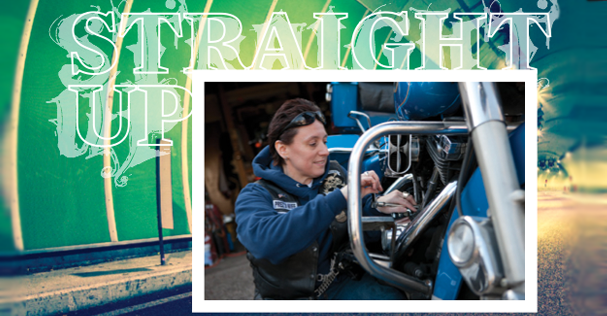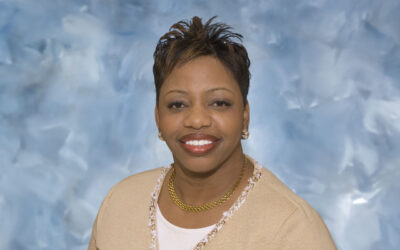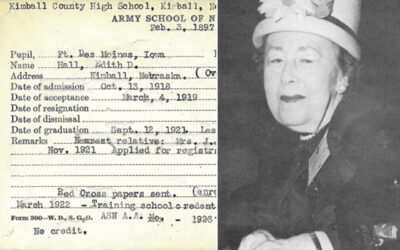By Matthew N. Skoufalos
From the OR to the blacktop to the dojo mat, Marla Packer-Perdunn, MDS, RN, lives a life of movement, hard work and emotional honesty.
The motorcycle and martial arts enthusiast got her first taste of caregiving at age 15, when she signed up to volunteer in the cadet corps of the Palmyra, N.J. ambulance service and as a candy striper at the Zurbrugg Memorial Hospital in nearby Riverside, N.J.

“I always wanted to be in the medical field,” she says. “That was never a question.” But it took a series of positions at a series of organizations to find her true passion of long-term care.
As a candy striper, “I went in and did all that corny stuff they did back in the 1980s,” Packer-Perdunn, 48, says. “I used to bring people down to therapy and X-ray. All the jobs they used to pay people to do, I did for ice water.”
“It seemed like each place I went to work, I got in on the ground level of things,” she says.
Packer-Perdunn worked for a few years as an EMT, then leveraged her experience into a full-time job as a nursing assistant at Zurbrugg. Two years later, the hospital awarded her a scholarship to Burlington Community College, where she received her ASN in 1989. After graduation, she worked as an RN at Zurbrugg on a variety of floors, including surgery, oncology and orthopedics.
“My favorite was working with the cancer patients there,” she recalls. “When you sat with the patients while they were getting premedication before chemotherapy, they told you about their lives.” Packer-Perdunn says working in oncology allowed her the most time to get to know her patients.
Finding her way
To Packer-Perdunn, the best part of being a nurse is forging relationships with patients and their families, an opportunity that arose with less and less frequency as the years passed. “Getting to connect with [patients] on a personal level…is not something you can do anymore,” she says. “There’s not the time anymore between all the paperwork that you have to get completed, which is necessary to avoid litigation.”
Although she marvels at the way medical technology has advanced since she left the floor, Packer-Perdunn says today’s nurses sometimes have a different agenda.

“That’s why I don’t work on the floor,” she says, “because if I can’t have that personal touch, that’s not what I went into nursing for.” Packer-Perdunn left Zurbrugg, when in 1995 it closed its nursing floors, for a job as a telemetry nurse at a nearby hospital. “But I started to get that feeling that people weren’t in it to connect with patients.” She slogged through five years at the facility, where she worked long hours in an environment that was not particularly supportive, she says.
“You hear young people talking, ‘There’s money here; I can make mad money.’ I say, ‘There’s people here, it’s not just about the money.’”
And even though she cedes that “we eat our young” in the nursing field, Packer-Perdunn says the experience taught her that people who enter the profession “need to a lot of looking deep, deep inside.”
A new direction
By 1999, she was disillusioned with the field. At the time, her 84-year-old mother was in the midst of recovery from a subdural hematoma that had landed her in the emergency room. She recovered and lived another three years in her own home after the accident, where Packer-Perdunn visited often and assisted with her care until she passed away.
Guiding her mother through the end of her life solidified Packer-Perdunn’s decision to pursue a career in long-term care. She says the field is difficult but rewarding. “People who are nearing death, they tell you what’s on your mind,” she says. “It’s a whole different interaction. It’s a straightup thing, and that’s how I am.” Packer-Perdunn got certified in Minimum Data Sets (MDS), a government-mandated reporting method on the functional capabilities of nursing homes, at the Masonic Home in Burlington, N.J. There, she witnessed “an incredible shift in long-term care – every room had a bathroom and a tub and a shower.” As an MDS coordinator, Packer-Perdunn began establishing long friendships with patients and realized she had finally found her calling.
One of those friendships was with a retired police officer. He noticed her Harley belt buckle, which Packer-Perdunn says earned her instant credibility. He took a special interest in the Harley Davidson Dresser – a police edition ElectraGlide – she rode to work every day.
“I came out one day and he was waxing my bike,” Packer-Perdunn recalls.
“I know you can’t take me for a ride,” he said, “but I thought I’d shine it up for you.”
“I’ve been able to get through to some patients that we’ve had difficulty with by them knowing that I ride,” she says. “They’ll see one of my belt buckles, and then they’re really impressed and when I tell them how big my bike is. It’s a good ice-breaker.”
A dream no more
The longtime dream of owning a Harley first came into view when Packer-Perdunn’s daughter Sarah began taking karate lessons from a fellow motorcycle enthusiast. The two became fast friends.
“There’s two goals I have in my life,” she told the sensei one afternoon after class. “I want to get a black belt and I want to ride a motorcycle.”
“I can help you with both of those,” he told her. “If you want to learn to ride, if you buy a bike, I’ll help you.”
The two began riding together, and when friendship and mutual interests turned into romance, they moved in together in 2005 and married soon after. With help from her sensei, Packer-Perdunn received a black belt in American kenpo, awarded to her by Joe Palanzo, one of the three protégés of the Kenpo Karate Association founder Ed Parker.
Today, the Perdunns ride with a club called The Sacred Bones Society, which World War II veterans founded in 1947 to deliver the remains of fallen soldiers back to their families. The society, which counts a large number of medical professionals among its 22,000 members, appealed to Packer-Perdunn because her father was a World War II veteran. Her husband is the president of the Burlington chapter, whose members ride together every other week.
Packer-Perdunn and her husband care for six children, including the best friend of Packer-Perdunn’s elder daughter Sarah. Packer-Perdunn became a legal guardian for the girl, Alex, to get her out of an unsupportive environment. Their house is also home to two dogs, two cats and three birds. “But not one of them did I pay for,” she says.
Packer-Perdunn’s caregiving nature defines her career and her home life. “Not only do I take in discarded people, I take in discarded animals,” she laughs
Marla’s Ride

A: Packer-Perdunn rides her impressively large motorcycle, nicknamed “The Great White,” to and from work.
B: The police edition Packer-Perdunn rides is usually reserved for police, firefighters and EMS. “Usually you’re supposed to take [the police insignias] off, but I grew up with half of the police, firefighters and EMTs in Burlington and worked with the other half, so they don’t hassle me,” she says.
C: Packer-Perdunn’s rings represent things that are close to her heart: a club ring for her motorcycle society, a HarleyDavidson wedding band (her husband’s is similar), and a pinky ring with her first initial, “M” that she bought for herself when she graduated from nursing school. “They didn’t have school rings, so I bought that as a reminder,” she says.
D: “Skeleton Bear” rides along with Parker-Perdunn, along with a stuffed pig that represents her love of HarleyDavidsons, nicknamed “hogs.”









